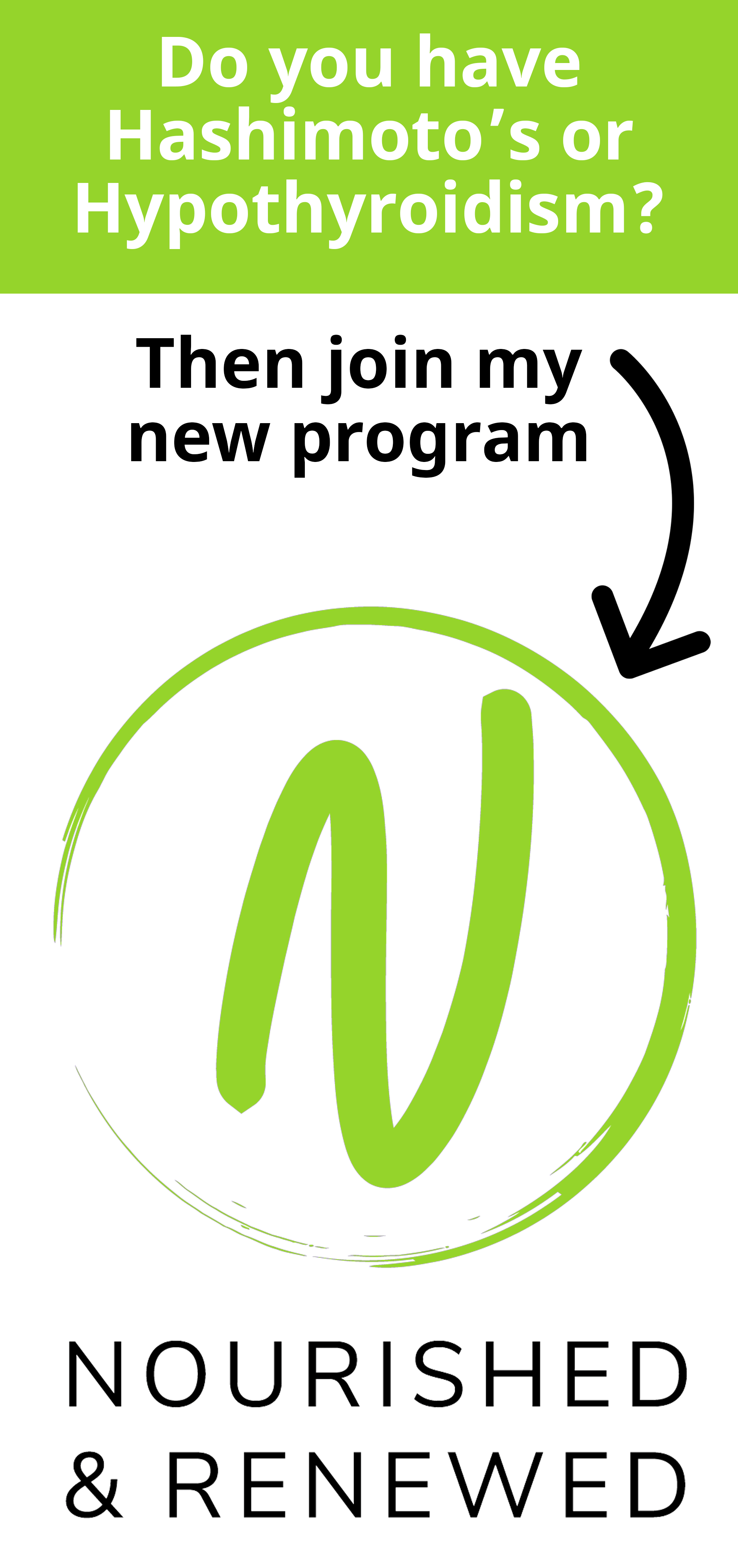My Journey With Hashimoto’s Disease
The beginning of my journey with Hashimoto’s will probably sound familiar to you. In my 20s, I suddenly felt like an old woman.
I had aches and pains. I was tired. And after rapidly gaining weight despite being petite my entire life, I was mildly depressed.
Like many Americans, I grew up on a less than healthy diet. I didn’t know there was another way to eat.
From the time I was a little girl, I had been plagued with digestive complaints, but no one ever wondered what could be wrong with me. Doctors just told me I had irritable bowel syndrome, and family members said I was “emotional.”
At the age of 24, I asked my doctor for a full panel of thyroid tests.
Although my doctor said I only needed a low dose of antidepressant medication, she acquiesced, and with my antithyroid antibody levels in the thousands—yes, thousands—I was diagnosed with Hashimoto's thyroiditis.
My prescribed treatment plan was simple: take medication for the rest of my life to “control symptoms.”
Like so many sufferers of Hashimoto’s, I struggled to feel better with this conventional approach.
When I was 30, I was diagnosed with celiac disease. After suffering three miscarriages before having my two beautiful children, I became convinced that my seemingly unrelated health issues were connected to my thyroid—and its dysfunction.
The text above is an excerpt of the forward I wrote for Karen Frazier’s book, “The Hashimoto's 4-Week Plan.”
It is still such a true testament to my own journey living with Hashimoto’s. And still such a beacon for why I love working with clients who also suffer with Hashimoto’s.
Each time I meet a new man or woman with the disease, I am again inspired to help them navigate their own set of circumstances and find the best healing path.

Nutritional Approaches for Every Stage in Hashimoto's
Have you recently been given a diagnosis of Hashimoto’s Thyroid Disease?
Perhaps your doctor has told you that you have elevated autoantibodies to your thyroid, and you will need to take a synthetic thyroid hormone medication for the rest of your life.
Are you a woman who has seen an elevation in autoantibodies due to low adrenal output or other hormonal changes such as pregnancy or menopause?
Do you just want to know what natural and nutritional approaches are best to help reduce your antibodies so you can start to feel really good again?

Causes of Hashimoto’s Disease
Hashimoto’s disease is the most common thyroid disorder in the United States, affecting over 14 million people.
Women are more likely to develop Hashimoto’s than men.
And, if you have the illness, you are more likely to develop a secondary autoimmune illness at some point later in life.
The exact cause of the disease is still under debate.
Thyroid autoantibodies are antibodies that develop when a person's immune system mistakenly targets the thyroid gland or thyroid proteins.
This leads to chronic inflammation of the thyroid (thyroiditis), tissue damage, and/or disruption of thyroid function.
Hashimoto’s is not caused by just one thing.
No one toxin, nutritional deficiency, or pathogen is at the root cause of the disease for most people.
Doctors don't know what causes the immune system to attack your thyroid gland.
Some scientists think a virus or bacterium might trigger the response, while others believe a genetic flaw may be involved.
It’s my belief that a combination of factors may determine your likelihood of developing Hashimoto’s:
- Genetic influences, especially MTHFR mutations
- Environmental exposures, including food antigens
- Pesticides and environmental chemicals, including glyphosate
- Deficiencies in total body nutrients that result from improper diet, toxic overload, or autoimmune disease
- Other hormone imbalances, such as reproductive hormones (estrogen/progesterone/testosterone), the adrenal glands (cortisol/adrenaline/noradrenaline/aldosterone) or other regulatory hormones (insulin, etc.)
- Lack of digestive integrity and increased permeability of the gut wall allow for foods and pathogens to enter the bloodstream where it shouldn’t
I like to think of Hashimoto’s as the perfect storm.
All of the wrong things have to be in place at the right time.

Thyroid Autoantibodies Explained
Laboratory tests detect the presence and measure the quantity of specific thyroid autoantibodies in the blood.
The thyroid is a small, butterfly-shaped gland that lies flat in the throat.
The primary hormones that the thyroid produces - thyroxine (T4) and triiodothyronine (T3) - are vital in helping to regulate the rate at which the body uses energy.
Basically, the thyroid regulates metabolism.
The body uses a feedback system in which thyroid stimulating hormone (TSH) stimulates the thyroid to produce T4 and T3 as needed.
This system helps maintain a relatively stable amount of the thyroid hormones in the blood.
When thyroid antibodies interfere with this process, they can lead to chronic conditions.
Autoimmune disorders associated with hyperthyroidism or hypothyroidism, are called Graves disease or Hashimoto thyroiditis, respectively.
Thyroid autoantibodies include:
- Thyroid peroxidase antibody (TPO)
- Thyroglobulin antibody (TGAb)
- Thyroid stimulating hormone receptor antibodies (TSHRAb), including thyroid stimulating immunoglobulin (TSI) and thyroid binding inhibitory immunoglobulin (TBII)
Mild to moderately elevated levels of thyroid antibodies may be found in a variety of thyroid and autoimmune disorders.
In general, the presence of thyroid antibodies suggests the presence of an autoimmune thyroid disorder and the higher the level, the more likely that is.
I suggest you order the following lab panel: Extended Thyroid Test for Hashimoto’s Thyroiditis. It costs just $129 but is valued at over $400.
The good folks at True Health Labs allow you to directly order labs that make the most sense for your health condition, allowing you to better participate in the overall management of your health.
If you do order these labs, be sure to take them with you to your next provider appointment.
Show them that you are willing to do what it takes to get the correct information for the best treatment plan possible.
Why Do Antibodies Matter?
Many doctors indicate that autoantibody levels will not change over time, and are not directly related to a patient’s symptoms.
Levels of autoantibodies that rise over time may be more significant than stable levels, as they may indicate an increase in autoimmune activity.
I find that autoantibodies are reflective of the autoimmune process, a patient’s degree of immune system dysfunction, and likely, the relative severity of their symptoms.
Routine screening of the thyroid usually involves the TSH test, and may show that the thyroid function is normal.
But, if autoantibody tests are included by your doctor, and show up positive, then it is confirmed that a degree of immune system dysfunction taking place.
A history of autoantibody testing is the best way to see patterns of changes over time.
Ideally, with proper nutritional therapy, we can see a decrease in the antibody levels, resulting in improved symptoms and quality of life. (That is very good news.)

You Can Heal Your Thyroid and Get Your Antibodies Back to Normal Levels
I am in my forties now, and my antibodies are back within normal levels.
Multiple doctors have told me my Hashimoto's is now in “remission.” They have even asked me *what I am doing!* to make that possible.
For that reason, many believe the medical community has a long way to go in understanding this complex disease.
Fortunately, there is much that we do know, and I am living proof that following self-care practices and healthy eating guidelines can go a long way in managing symptoms.
It took me years of trial and error and in-depth nutrition studies to find my way to better health.
Finding the right balance for your own body is the best way to restore your thyroid health.
Our goal through nutritional therapy for Hashimoto’s is to:
- improve digestive function
- eliminate foods which may be triggers for symptoms
- support the immune system
- restore overall balance in the endocrine system
The Wrong Foods Can Increase Antibody Levels
Here is an overview of how different foods, food additives, preservatives, chemicals, etc., can negatively affect the body and the thyroid.
Leaky Gut & Intolerances
In the case of Hashimoto's, foods themselves may be creating problems.
Leaky gut is one of the primary triggers for all autoimmune disease, including autoimmune thyroid disease.
Leaky gut occurs when your gut (small intestine) becomes permeable or has tiny breakages between the cell junctures.
These breakages allow particles to leak from your digestive tract and travel freely through your bloodstream. Yikes!
Food sensitivities (particularly to foods containing highly antigenic proteins like from gluten/wheat or dairy/casein) are due to their presence on the wrong side of the gut wall.
Other intolerances can occur - as people are becoming increasingly reactionary to all kinds of “stuff” added to our food supply:
- Synthetic (growth) hormones added to conventionally-raised meats and dairy can disrupt the overall endocrine system
- Additives, preservatives, colorings, dyes, thickening agents, artificial sweeteners and flavors (AKA “Franken foods!") affect our body’s ability to properly digest, assimilate and excrete foods, thereby allowing them to stay present in our system longer, possibly reaching the brain where they can act as “exito-toxins” and cause mood, memory or brain fog issues
- GMOs (genetically modified organisms) in our food supply have not been studied long-term, but new evidence implicates GMOs in health problems including food intolerances and digestive disorders
- Pesticides on our foods - such as glyphosate - are another component of food reactivity
Molecular Mimicry
When you have elevated antibodies, such as those found in Hashimoto's disease, your body has found something antigenic (something it perceives to be a "foreign body").
When your body perceives a threat from a foreign body, your immune system will feel a need to be extra vigilant and essentially launch an attack.
Autoimmune diseases are the byproduct of the immune system falsely recognizing "self" as "invader,", which can lead to inflammation and destruction of specific tissues and organs (this is called "immunopathology").
Different foods, proteins, viruses, bacteria and other environmental antigens can all have cross-reactive properties in the body.
Cross reactivity means that some things that are not our body can look and act like our own body tissues. Say wha'?!
Ok, I get that this is slightly confusing.
Let me refer you to a brilliant doctor on this one:
Dr. Amy Meyers explains molecular mimicry on her website in the most understandable way I have found to date.
And, so, when we eat a certain "mimicking" food day in and day out, oops, well, our immune system starts to get a little confused. I like to call this the "wonky" immune system.
So, you can see, it is important to avoid or completely eliminate foods high on the molecular mimicry scale (such as gluten and casein, the proteins found in wheat and dairy products, respectively) to preserve normal immune function and reduce inflammatory reactions.
Candida & Yeast
Bacterial imbalances in the intestines are another way in which your body can negatively respond to certain foods.
For example, if you have candida, which is a bacteria/yeast that can quickly over-colonize your digestive tract and ultimately compromise your thyroid health, you will be sensitive to certain foods.
Like sugar.
So, when you eat foods that contain refined sugars, you are actually feeding the candida/bacteria/yeast.
They love sugar!
Sugar - as it feeds the candida/bacteria/yeast - can aggravate the inflammatory and antigenic response, and anti-thyroid antibody levels will go up.
No bueno.
In this case, a sugar-free program, gut healing nutrients and foods, as well as regular detoxification can be particularly helpful to improving symptoms.
The Right Foods Can Lower Antibody Levels
Here's the best news all day: most of my clients report that their thyroid symptoms decrease with a clean, home-cooked food plan prepared with high-quality ingredients.
Phytonutrients to help your thyroid produce enough natural hormones
By supporting your immune system, you can reverse your condition. (True.)
So, a plan that involves eating lots of vitamin-rich foods packed with nutrients is vital to your immune system, thyroid gland, and overall health.
If you are eating the fresh, organic plant-based foods which your thyroid needs to function optimally, your thyroid will be able to produce enough of its own natural hormones.
And, it will be better able to convert hormones into the active state, and then enter your cells for optimum metabolic activity.
Every single one of your trillions of cells needs phytonutrients.
Phytonutrients are the “magic” found in foods - think of the rainbow of colors available in plant foods! Bright green leafy veggies, orange peppers and melon, yellow squash, purple cabbage, red radishes and berries, and so on!
Protein to support a healthy thyroid
Are you consuming enough grass fed, pasture-raised animal protein? Occasional wild caught fatty fish? Daily pastured eggs?
Why people with thyroid disease need animal meat/protein:
- Protein and essential amino acids (building blocks of protein) are needed for the recovery and repair of all of the glandular tissues in our body.
- Protein is needed to transport thyroid hormones throughout the body.
- Animal meat contains tyrosine which is the precursor amino acid for the thyroid gland hormone thyroxin.
- Animal meat is rich in vitamin B12 and iron (as well as many other vitamins and minerals) which are key in converting the T4 thyroid hormone (whether in its natural form or synthetic like Synthroid) to the T3 hormone.
But, not all protein is created equal and it can be difficult to get adequate protein intake from diet alone. Many of my clients have aversions to animal protein, intolerances to certain animal proteins like eggs or fish.
It is important to work with a holistic nutritionist to figure out the right protein plan for you.
For some, such as vegans with Hashimoto’s, protein shakes and amino acid supplements come into the picture.
Detoxifiers to move toxins that are clogging your thyroid
The thyroid gland is known to store certain toxins which enter our bodies.
Chemicals like perchlorate (rocket fuel, yuck), heavy metals (even mercury, yikes!) and EMF (electro-magnetic frequency) radiation all get stored in our thyroid gland.
Are you freaking out yet?
Therefore, it’s important to think of ways every day to reduce our toxic load.
Certain foods, herbs and supplements aid our livers in the detoxification process. These include apples, beets, carrots, ginger, garlic, milk thistle, aloe vera, and turmeric.
Try to include one or more of these medicinal foods in your plan every day.
You can drink a healing "bedtime beverage" of gentle herbs before sleep to assist your body’s detoxification processes during peak healing times - while you are snoring.
- Milk thistle and turmeric are anti-inflammatory and highly-antioxidant that can be taken as a tea. Both milk thistle and turmeric support liver and gallbladder function, crucial to effective body detoxing.
- Aloe vera is an anti-inflammatory juice or gel that aids in digestion and can also support organ detox.
- Dandelion Root tea is pleasant tasting and makes a great coffee substitute. Taken at bedtime, this herbal tea promotes healthy liver function and supports total body detox.
- Yogi DeTox tea (my favorite) blends time-honored cleansing herbs Burdock and Dandelion with Juniper Berry and traditional Ayurvedic blend “trikatu” (Ginger, Black Pepper and Long Pepper). Indian Sarsaparilla, Licorice, Cinnamon, Cardamom and Clove round out this deliciously spiced blend. These herbs support healthy total body detox and are also very soothing after a long day.
Finally, this is important: "detox" your home environment as well as your food plan.
Take a look around - how many chemicals, plastics, endocrine-disrupters, and potential antigens are in your home, work, make-up bag, cleaning supplies, etc.?
Think about textiles, sunscreens, perfumes, paints and polishes, non-stick cookware and even gardening products. Toxins are everywhere. Literally. Everywhere.
Pitch the junk in your home that may be clogging your thyroid and making you sick.
Check out the Environmental Working Group for more help on how to do this.
Testing Confirms Progress and Healing of the Thyroid
Lab testing confirms that autoantibodies decrease when the diet is modified and certain trigger foods (food sensitivities) are eliminated.
That is because when the immune system no longer continually sees a foreign material in the bloodstream, its efforts to clear out the foreign substance and its overall heightened response diminishes.
In my practice, I focus on nutritional solutions.
Nutritional solutions have a big impact on anti-thyroid antibody levels.
And, it's important for me to state here, that I do not oppose the use of thyroid medications. And I frequently work with clients who are on thyroid hormone replacement medicine. Synthetic, natural, or a combination.
In fact, I have been taking synthetic thyroid hormone medication since 2003. Without it, I would not be well - at all. My antibodies are in remission. But, my thyroid does not have enough OOMPH to produce the hormones it once did before the autoimmune attack.
I believe it is important that we work together with your doctor to monitor your progress through frequent labs and symptom checklists to determine if our programs are working for you. See if your doctor supports frequent antibodies testing.
That is a good place to start.
You may choose to begin dietary and nutrient support in concurrence with a medical treatment plan. And then make a decision with your doctor - based on labs - as to whether or not you can taper down medication dosage over time.
And, it goes without saying, but it is important to speak to your doctor about nutrition and lifestyle changes you are making for the benefit of your thyroid and overall health.
Nutritional Tips for Lowering Autoantibodies in Hashimoto’s
Please keep in mind there is no one-size fits all approach. Working with your doctor and a qualified holistic nutritionist often produces the best results.
I recommend the following natural approaches as a basic starting point for healing the thyroid:
- Focus on a whole foods diet, using organic foods, consuming approximately 10 servings of fresh, local, seasonal vegetables and fruits per day
- Remove gluten from the diet because of molecular mimicry, intolerances and pesticide contamination like from glyphosate
- Remove caffeine because it over-stimulates the thyroid and taxes the stress-hormone producing glands called the adrenals
- Reduce sugar and refined carbohydrates because sugar causes inflammation and feeds overgrowth of the wrong/bad bacteria in our gut
- Consume sufficient amounts of quality animal protein, as protein is needed to stimulate the thyroid gland, and also repair the tissue of the affected area (where antibodies have attacked the gland).
- Take in an abundance of healthy fats, as “good fat” has been shown to be extremely helpful in lowering inflammation for most clients suffering from Hashimoto’s
- Practice daily detoxification strategies as much as you can. Assess your home cleaning products, beauty products, plastics in your home/kitchen, alcohol consumption and stress patterns.
- Implement a ritual for self care - a minimum of 4 hours per week is all it takes to help heal your thyroid. Self care does not include hiding in the laundry room folding towels all by your lonesome. I am talking about laughing with friends, window shopping, getting a massage, taking a hike, reading a magazine, bubble baths...you get the picture.
- Make sure you have a good sleep regimen. Sleep, sleep, sleep! (Naps, rest, slowing down all good too!)
- Laugh, surround yourself with supportive friends and family and try not to let the disease define you or control you.
Looking for more nutrition guidance specifically for Hashimoto's?
I have put together a Hashimoto's self paced online program that takes into account your total health. It's a 30 day self-paced online program which teaches you about the thyroid, empowers you to live more fully with your illness and inspires you to make the changes that make a huge impact on your life.
I recommend you to check out Nourished and Renewed with Hashimoto's.
If you are looking for a tailored approach, consider my Happy & Healthy Adult Program - designed for individuals with Hashimoto's looking for a personalized, sustainable and joyful approach to nutrition and lifestyle measures which can help heal your thyroid.






